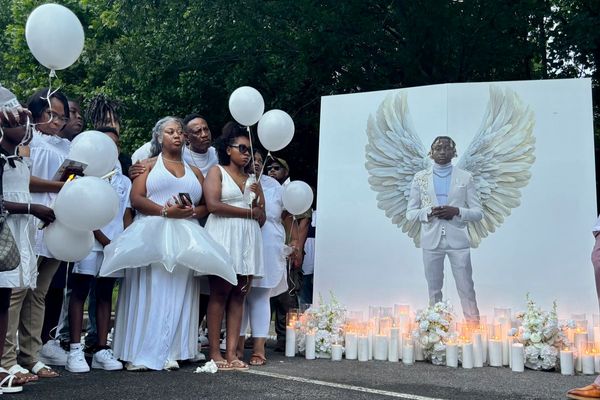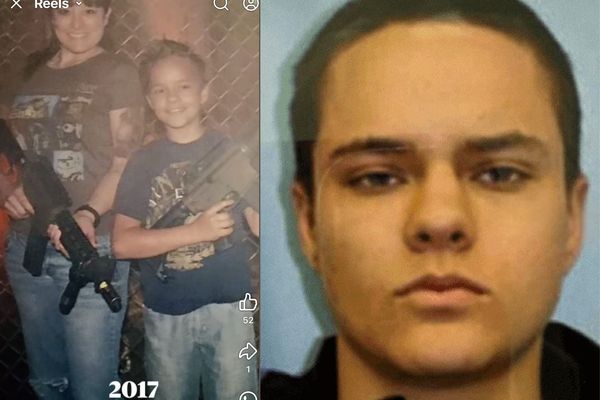
Kristi Johnston, like many young people, spends a good deal of time swiping left and right on various dating apps. But unlike most people looking for love, this is her job.
Johnston, 26, is the national press secretary for NextGen, an organization dedicated to getting out the youth vote.
Earlier this year, she crafted a Hinge profile that included her age, flattering selfies and pictures with friends, and prompts such as “The key to my heart is being pro-choice” or “Together we could vote on April 4th and get drinks after.”
The premise was simple: to increase voter turnout in an important election like today’s Wisconsin supreme court race, Johnston would match with guys on dating apps, and when they slid into her DMs, she made sure they were registered and pledged to vote.
The stakes in the Wisconsin supreme court election, are high. The state’s highest court has a 4-3 conservative majority, but conservative judge Patience Roggensack is retiring from the bench. Wednesday’s race determines where the court will lean, and thus decide the fate of future laws on abortion and voting rights.
Johnston, who launched this first-of-its kind canvassing method, got the idea at the height of the pandemic, when NextGen switched to virtual organizing.
“We’re couldn’t be on college campuses with clipboards, so we had to get creative in the digital space,” she said. “We definitely recognized the fact that young people are not picking up a phone call. They’re deleting a text pretty quickly after we send it to them.”
Vanderbilt University published a report from April 2020 that found 31% of millennial respondents were using online dating services more often than before the pandemic. And for young Americans, who would, as one Twitter user put it, “rather pick up a pinless grenade than a call from an unknown number”, this new strategy seemed to be a stroke of genius.
According to exit polls from the November 2022 midterms, 70% of young voters in Pennsylvania turned out to now senator John Fetterman’s advantage.
Young voters also turned out en masse for previous Wisconsin elections. According to Tufts University’s Center for Information and Research on Civic Learning and Engagement (Circle), Wisconsin is “an above-average youth registration (68%) state and, historically, a high turnout state”. In 2022, 79,000 young Wisconsin voters showed up and secured a win for the Democratic governor, Tony Evers, who defeated his Republican opponent, Tim Michels, by 89,000 votes. They also favored the Democratic Senate candidate Mandela Barnes by 19 points, who only narrowly lost his election to Republican Ron Johnson.
These figures sparked curiosity for Johnston.
The dating app organizing effort officially began with the 2022 Wisconsin Senate race that saw Democrat Barnes lose by a slim margin to Johnson. And for the past few weeks, Johnston has been playing the field to help the Wisconsin supreme court race which culminates today.
Also at risk is Johnston’s romantic life. One potential dating prospect promised he would take her to a Green Bay Packers NFL game, but when another singleton found out she was a voting organizer, he scolded her and ghosted.
“He’s just like, clearly pissed off that he’s not getting a date out of it,” she said.
Even cheesier were Johnston’s pick-up lines. “Are you registered to vote?” one outgoing message read. One match responded that he was in fact registered to vote. “Hot,” she replied. The sparks were flying like the Fourth of July.
Others were not so thrilled. One man quickly wrote back to Johnston’s request for him to pledge to vote: “I already get texts every day about this election. I feel like there is a better platform to get people to go out and vote than Hinge.”
When asked if Johnston felt guilty or untruthful for being a covert voting organizer, she said: “It’s not like I’m like matching with these people and might not ever see them. I could very well go and have a few drinks.”
This also isn’t the first instance of a dating app being used for a purpose other than striking up a romance. In July 2021, a Bumble user in Texas reported one of her matches to the FBI when she suspected he participated in the 6 January riots at the US Capitol. She turned out to be right and he was arrested.
Whether the future of getting out the vote lies on a dating app remains to be seen, but one thing is clear: for young voters, gone are the days of canvassing via TV ads, phone banking, and knocks on the door. It’s not yet evident how fruitful Johnston’s efforts have been, as the only way she and her team have been measuring for success is by logging as many volunteer “swipe” hours as possible.
But Johnston’s dating life has never been more active. She has a few drinks lined up after the polls close.
“I don’t think a boyfriend is coming out of this yet,” she said. “But who knows? I could very well fall in love. Maybe.”







